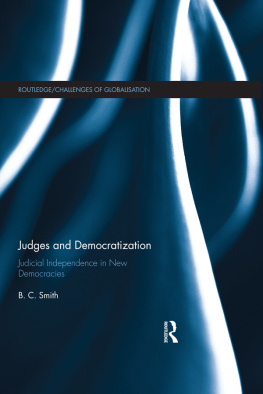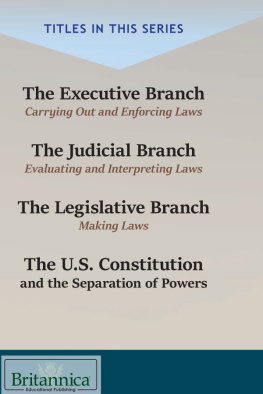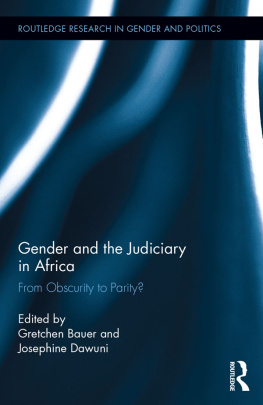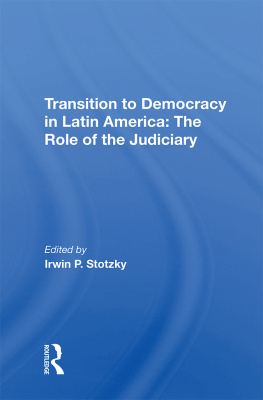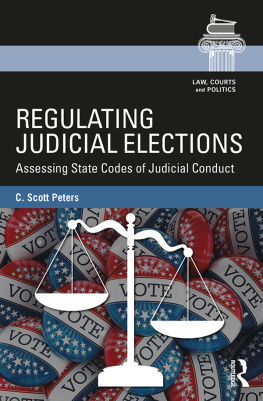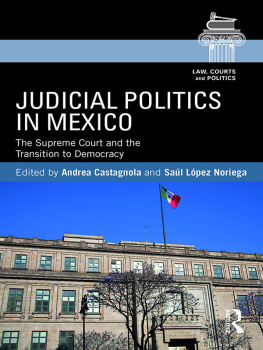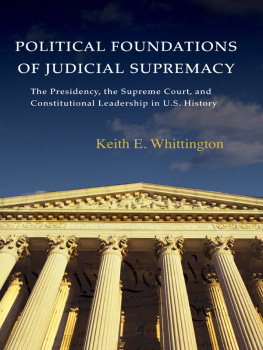Judges and Democratization
Judiciaries must be politically impartial and immune from political interference if democracy is to be consolidated in countries in transition from authoritarian rule. Without an independent judiciary there can be no rule of law, and without the rule of law there can be no democracy.
Judges and Democratization is based on the premise that democracy cannot be consolidated without the rule of law of which judicial independence is an indispensable part. It pays particular attention to the restraints placed upon judicial independence, and the reforms which are being applied, or remain to be adopted, in order to guard against the different kinds of interference which prevent judicial decisions being taken in a wholly impartial way. It examines the paradox of judicial activism arising from the independence endowed upon the judiciary by post- authoritarian constitutions. The book asks how, in the context of this endowed authority, such accountability can be made compatible with the preservation of judicial independence when the concept of an accountable, independent judiciary appears to be a contradiction in terms.
This text will be of key interest to teachers and students of politics, comparative government/politics, combined politics and law, democracy and governance, human rights and democratization, and democratic development.
B. C. Smith is Emeritus Professor of Political Science and Social Policy, University of Dundee, UK.
Routledge/Challenges of Globalisation
Edited by Charles Sampford and Carmel Connors
Griffith University, Australia
This series seeks to make systematic contributions to international debates over two intimately related issues:
- The values that should inform the governance of modern states and the globalizing world in which they are increasingly enmeshed, in particular whether the liberal democratic values that sought to civilize the sovereign state need to be reconceived as global values.
- The institutions that are needed to realize those values, be they local, national, regional, international, transnational or global.
6 New Visions for Market Governance
Crisis and renewal
Edited by Kate MacDonald, Shelley Marshall and Sanjay Pinto
7 Shifting Global Powers and International Law
Challenges and opportunities
Edited by Rowena Maguire, Bridget Lewis and Charles Sampford
8 Institutional Supports for the International Rule of Law
Edited by Charles Sampford and Ramesh Thakur
9 Access to International Justice
Edited by Patrick Keyzer, Vesselin Popovski and Charles Sampford
10 Strengthening the Rule of Law through the UN Security Council
Edited by Jeremy Farrall and Hilary Charlesworth
11 Law, Lawyering and Legal Education
Building an ethical profession in a globalizing world
Charles Sampford and Hugh Breakey
12 Norm Antipreneurs and the Politics of Resistance to Global Normative Change
Edited by Alan Bloomfield and Shirley V. Scott
13 Judges and Democratization
Judicial Independence in New Democracies B. C. Smith
Also by B. C. Smith
Field Administration: An Aspect of Decentralization
Advising Ministers
Administering Britain (with J. Stanyer)
Policy-making in British Government
Government Departments: An Organizational Perspective (with D. C. Pitt)
The Computer Revolution in Public Administration (with D. C. Pitt)
Decentralization: The Territorial Dimension of the State
Bureaucracy and Political Power
Progress in Development Administration
British Aid and International Trade (with O. Morrissey and E. Horesh)
Understanding Third World Politics (fourth edition)
Good Government and Development

